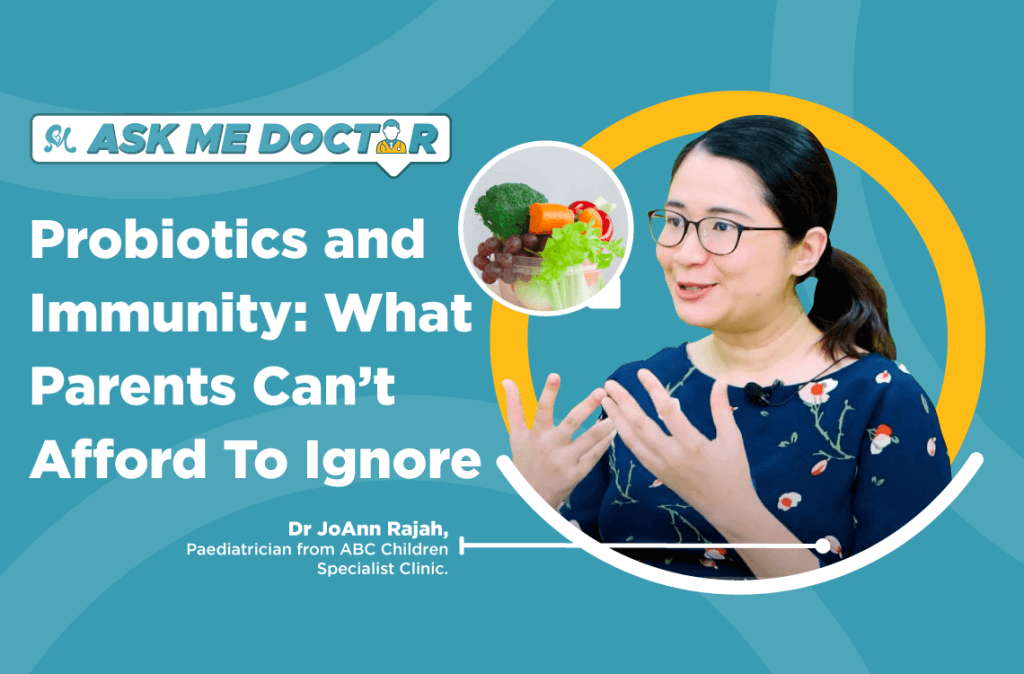Many people may have heard that it is important to take probiotics, but most probably do not understand why it is important or how it works. With all the supplements and information out there, it can get quite confusing.
For this episode of AskMeDoctor!, Dr JoAnn Rajah, a paediatrician from ABC Children Specialist Clinic, will help us understand how probiotics can help boost our immune system by improving gut health.
Q1: What is the correlation between probiotics, immune system and gut health?
Dr JoAnn Rajah: Now, not many people know this, but the gut is one of the largest immune organs in the body. The gut contains trillions of tiny living things called microbes consisting of bacteria, viruses, and fungi that live in harmony.
Probiotics refer to the “friendly” and “helpful” bacteria in the gut that helps to maintain gut health and boost the immune system. Sometimes, there can be imbalances between these microbes leading to diarrhoea and other health-related diseases.
Q2: How do these “friendly” and “helpful” bacteria help to support our immune system?
Dr JoAnn Rajah: Probiotics support the immune system in various ways. They help strengthen the gut barrier, thus reducing the risk of invasion by bacteria leading to infection.
On top of that, probiotics also activate and enhance the immune system by boosting immune cells like T-lymphocytes, producing antibodies and antibacterial substances upon sensing invaders.
Q3: What are the other uses of probiotics?
Dr JoAnn Rajah: One of the widely known benefits of probiotics is that it helps to prevent or reduce severity of diarrhoea. For example, did you know that one of the common side effects of antibiotics is diarrhoea? Giving probiotics pre-emptively does reduce the risk of antibiotic-associated diarrhoea.
Besides that, recent research has also shown that probiotics may help improve mental ailments such as depression and anxiety. It may also reduce certain allergies, for example, eczema. However, more research needs to be done regarding this.
Q4: Do we need it after antibiotics or can it be taken during a course of antibiotics?
Dr JoAnn Rajah: Usually, probiotics should be given when antibiotics are being prescribed, however, you should not consume both together. There should be a gap of at least about 1 to 2 hours between both. It is to repopulate the gut once again with good and friendly bacteria, to prevent diarrhoea.
Q5: How much probiotics do we need to help strengthen our immune system? What is the recommended daily dosage?
Dr JoAnn Rajah: Typical dosages will vary based on products, however, the common dosages range from 5 to 10 billion colony-forming units for children and double the amount for adults.
Q6: What are the sources of foods which contain probiotics?
Dr JoAnn Rajah: Naturally occurring probiotics are present in foods such as sauerkraut, tempeh, kimchi, pickles, miso, kombucha, some types of cheese and buttermilk, yogurt and cultured milk drinks. Taking these foods regularly will help to stimulate the immune system.
Q7: What are things that I can look for in good probiotics?
Dr JoAnn Rajah: There are various probiotics available in the market consisting of different strains. However, one of the commonly used probiotics would be Lactobacillus species, in particular Lactobacillus acidophilus and Lactobacillus paracasei.
Q8: What else can I do to improve my child’s immunity?
Dr JoAnn Rajah: Every child should have a well-balanced diet rich in micronutrients such as Vitamin C, D, E, iron, zinc, selenium and many more. Keeping children active and getting adequate sleep at night is also vital to support the immune system.
Q9: Do you have any final words of wisdom?
Dr JoAnn Rajah: Probiotics can help boost a child’s immune system. However, before buying any probiotic supplement for your child, it would be a good idea to talk to your doctor.
Probiotic supplements need to be tailored to individual needs to get the maximum benefits. And not to forget the list of delicious food that I mentioned earlier, which contain a very good source of probiotics.
Stand to win 20 bottles of free VITAGEN and a cool, cooler bag, when you answer a simple question. Tag 3 friends and share Motherhood Facebook post. This giveaway will be awarded to 10 lucky winners. Hurry, don’t delay.
Stay tuned with our AskMeDoctor series at Motherhood Story and our Facebook page.
